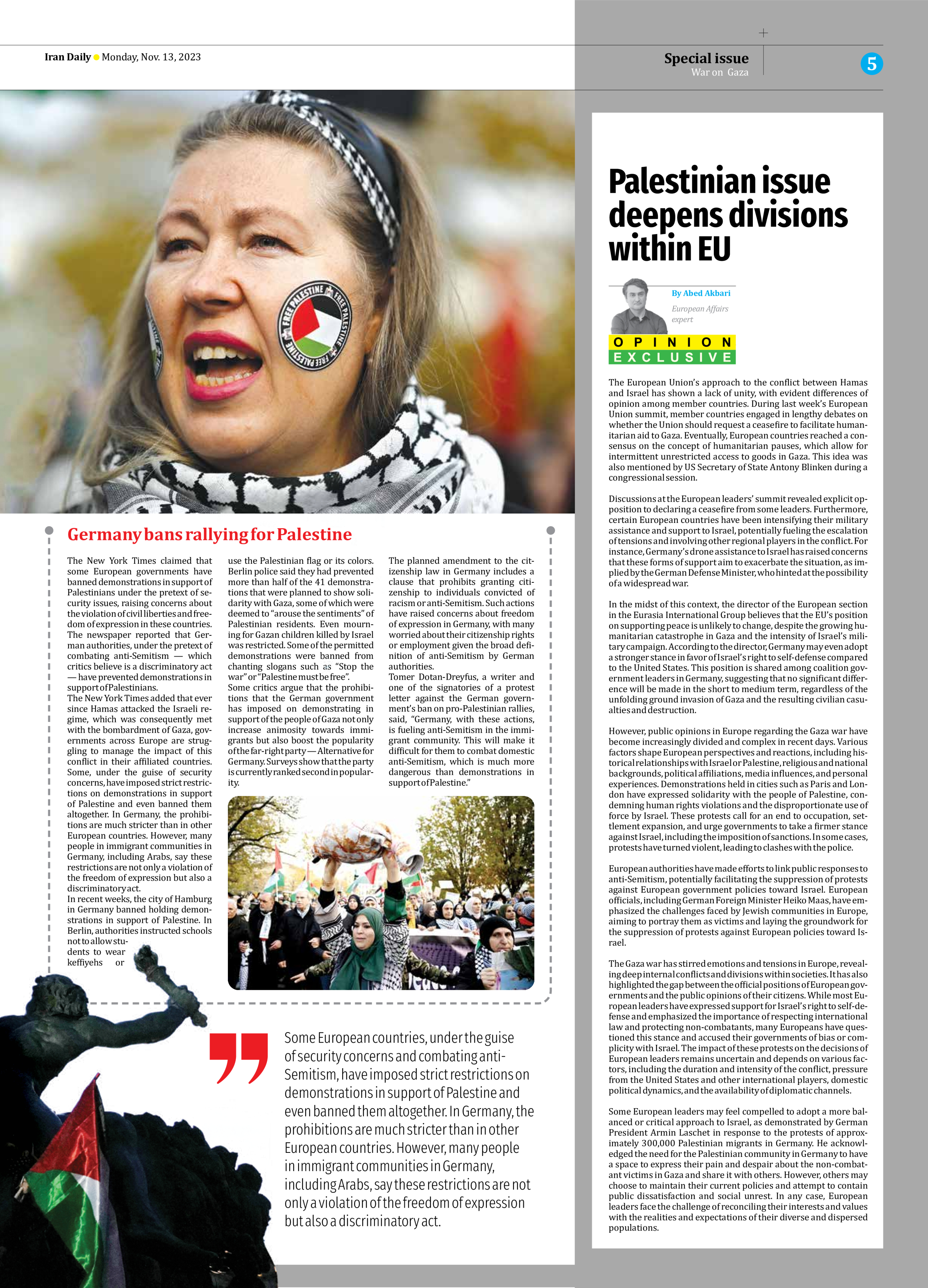
Palestinian issue deepens divisions within EU
By Abed Akbari
European Affairs expert
The European Union’s approach to the conflict between Hamas and Israel has shown a lack of unity, with evident differences of opinion among member countries. During last week’s European Union summit, member countries engaged in lengthy debates on whether the Union should request a ceasefire to facilitate humanitarian aid to Gaza. Eventually, European countries reached a consensus on the concept of humanitarian pauses, which allow for intermittent unrestricted access to goods in Gaza. This idea was also mentioned by US Secretary of State Antony Blinken during a congressional session.
Discussions at the European leaders’ summit revealed explicit opposition to declaring a ceasefire from some leaders. Furthermore, certain European countries have been intensifying their military assistance and support to Israel, potentially fueling the escalation of tensions and involving other regional players in the conflict. For instance, Germany’s drone assistance to Israel has raised concerns that these forms of support aim to exacerbate the situation, as implied by the German Defense Minister, who hinted at the possibility of a widespread war.
In the midst of this context, the director of the European section in the Eurasia International Group believes that the EU’s position on supporting peace is unlikely to change, despite the growing humanitarian catastrophe in Gaza and the intensity of Israel’s military campaign. According to the director, Germany may even adopt a stronger stance in favor of Israel’s right to self-defense compared to the United States. This position is shared among coalition government leaders in Germany, suggesting that no significant difference will be made in the short to medium term, regardless of the unfolding ground invasion of Gaza and the resulting civilian casualties and destruction.
However, public opinions in Europe regarding the Gaza war have become increasingly divided and complex in recent days. Various factors shape European perspectives and reactions, including historical relationships with Israel or Palestine, religious and national backgrounds, political affiliations, media influences, and personal experiences. Demonstrations held in cities such as Paris and London have expressed solidarity with the people of Palestine, condemning human rights violations and the disproportionate use of force by Israel. These protests call for an end to occupation, settlement expansion, and urge governments to take a firmer stance against Israel, including the imposition of sanctions. In some cases, protests have turned violent, leading to clashes with the police.
European authorities have made efforts to link public responses to anti-Semitism, potentially facilitating the suppression of protests against European government policies toward Israel. European officials, including German Foreign Minister Heiko Maas, have emphasized the challenges faced by Jewish communities in Europe, aiming to portray them as victims and laying the groundwork for the suppression of protests against European policies toward Israel.
The Gaza war has stirred emotions and tensions in Europe, revealing deep internal conflicts and divisions within societies. It has also highlighted the gap between the official positions of European governments and the public opinions of their citizens. While most European leaders have expressed support for Israel’s right to self-defense and emphasized the importance of respecting international law and protecting non-combatants, many Europeans have questioned this stance and accused their governments of bias or complicity with Israel. The impact of these protests on the decisions of European leaders remains uncertain and depends on various factors, including the duration and intensity of the conflict, pressure from the United States and other international players, domestic political dynamics, and the availability of diplomatic channels.
Some European leaders may feel compelled to adopt a more balanced or critical approach to Israel, as demonstrated by German President Armin Laschet in response to the protests of approximately 300,000 Palestinian migrants in Germany. He acknowledged the need for the Palestinian community in Germany to have a space to express their pain and despair about the non-combatant victims in Gaza and share it with others. However, others may choose to maintain their current policies and attempt to contain public dissatisfaction and social unrest. In any case, European leaders face the challenge of reconciling their interests and values with the realities and expectations of their diverse and dispersed populations.







